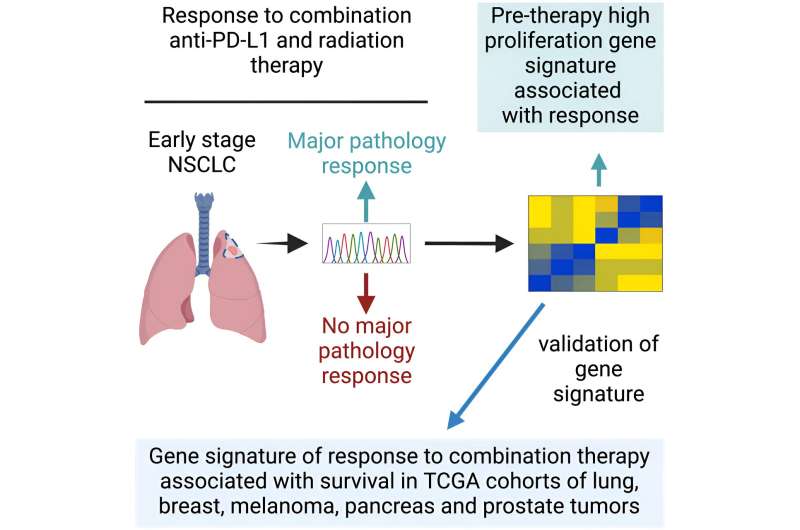This article has been reviewed according to Science X's editorial process and policies. Editors have highlighted the following attributes while ensuring the content's credibility:
fact-checked
trusted source
proofread
Genetic signature may predict response to immunotherapy for non-small cell lung cancer

A new study identified a set of 140 genes that may help predict enhanced disease-free survival in patients with non-small cell lung cancer (NSCLC) treated with a combination of immunotherapy and low-dose radiation. The results, published in Cell Reports Medicine, suggested that this "gene signature" could be used to identify a subclass of lung tumors that is more likely to be eradicated by immunotherapies.
Immunotherapy has saved countless lives, but only 20 to 25 percent of patients respond to this treatment that activates a person's own immune system to attack their cancer. Predicting who would benefit from this approach and why could help patients who have exhausted other options, such as chemotherapy.
Studying a cohort of 60 patients with NSCLC, the team determined previously that adding a low dose of radiation to a course of durvalumab, an immune-boosting drug, promoted cancer-free survival in most of these individuals. Now, to assess why some tumors didn't respond to the therapy, the researchers examined pretreatment tumor biopsies from this study cohort.
They determined the gene expression profiles, which showed the specific genes that were turned up and those that were turned down in each sample.
They compared the gene expression profiles of ten tumors that reached major pathologic response (MPR)—the elimination of more than 90 percent of the cancer cells in patients' tumors—with combination treatment versus six that did not.
They discovered the two groups of pretreatment tumors could be reliably distinguished by a set of genes, with 135 of the genes turned up and 5 turned down. The majority of the 135 genes were associated with enhanced cell growth, suggesting the tumors that responded to the dual therapy were particularly aggressive.
The researchers were also able to examine how the gene expression profile changed in the responsive cancers before and after treatment. They found that in tumors displaying MPR, dual therapy not only reversed the activity of this 140-gene set but also increased the activation of genes associated with cellular pathways involved in immunity and tissue repair.
The activity of the 140 genes that correlated with treatment response is particularly promising as clinicians could use the signature to identify people who would gain the maximum benefit from immunotherapy.
The researchers plan to test whether tumors with this aggressive gene signature have a better response to the combination therapy in a larger patient study.
More information: A signature of enhanced proliferation associated with response and survival to anti-PD-L1 therapy in early stage non-small cell lung cancer., Cell Reports Medicine (2024). DOI: 10.1016/j.xcrm.2024.101438. www.cell.com/cell-reports-medi … 2666-3791(24)00061-2




















